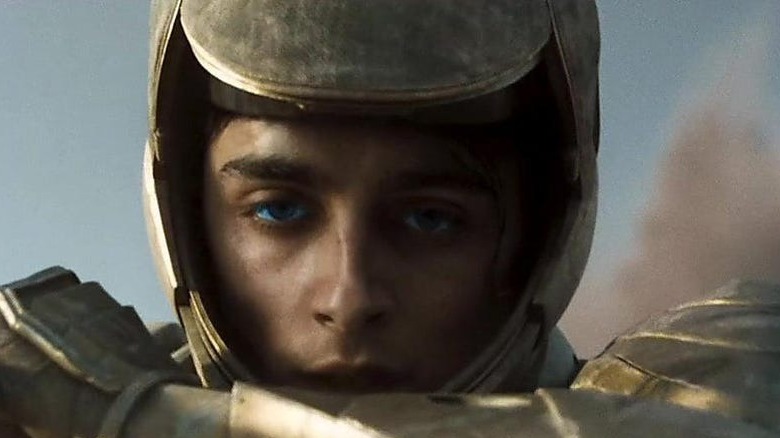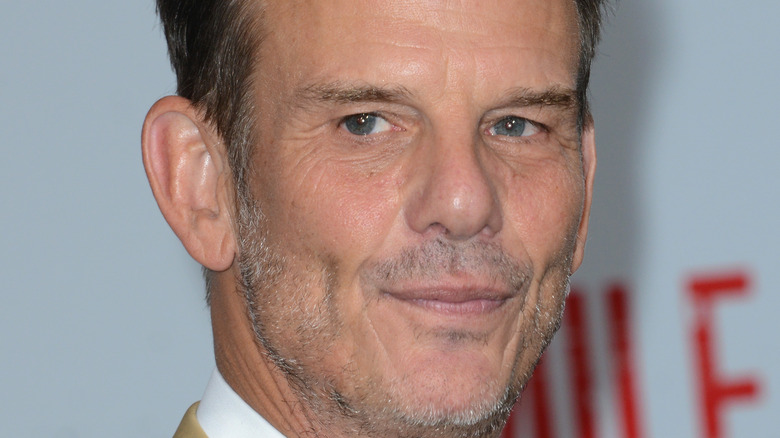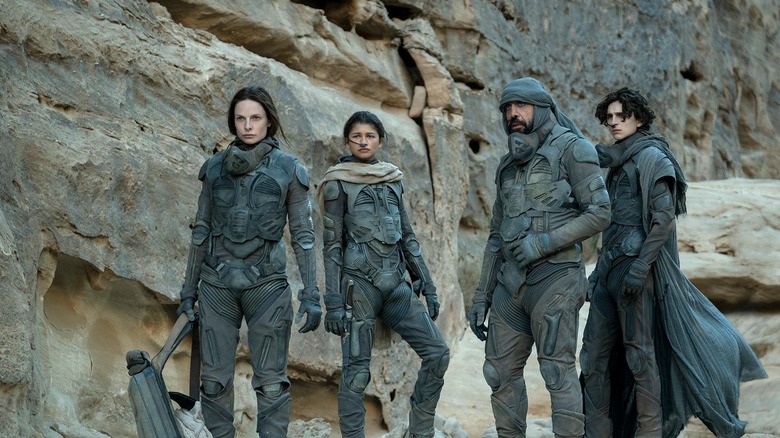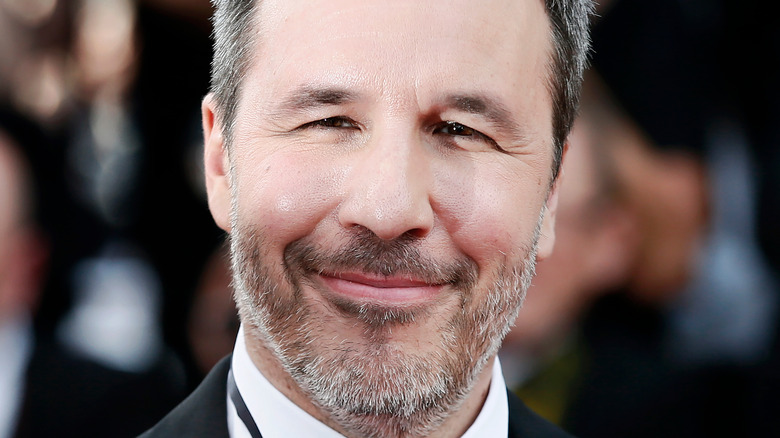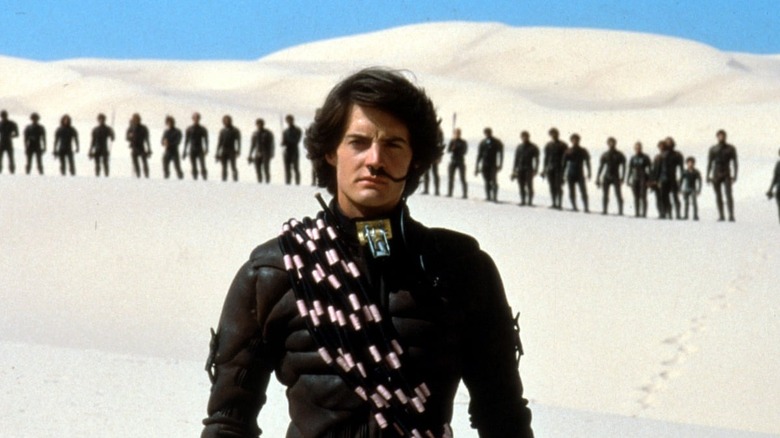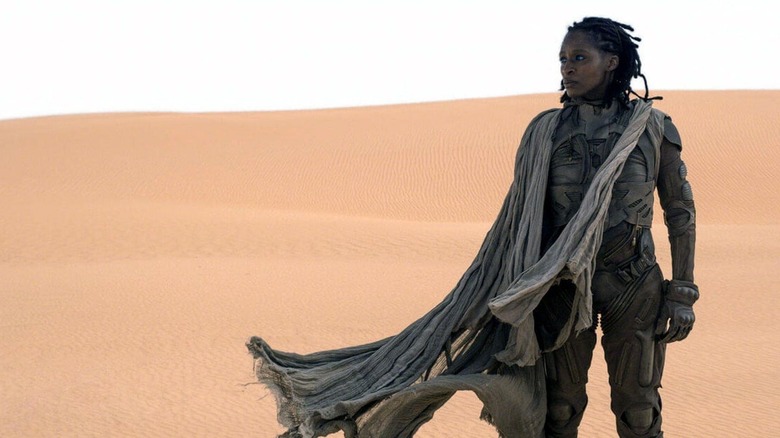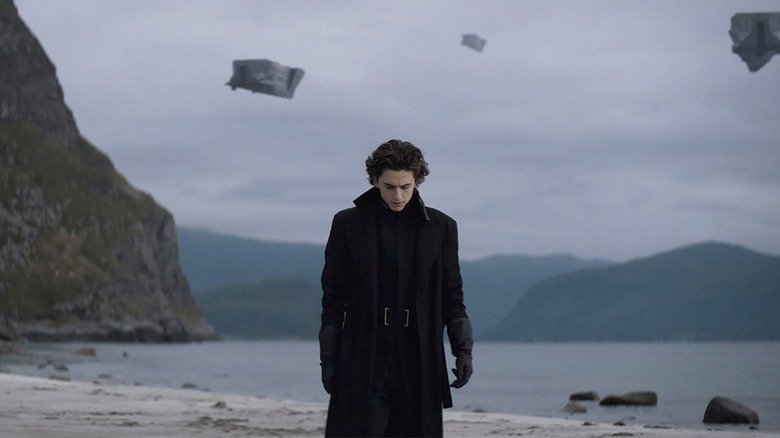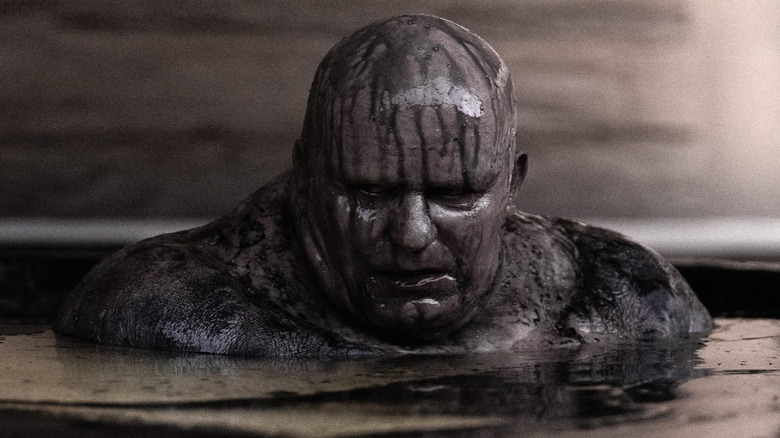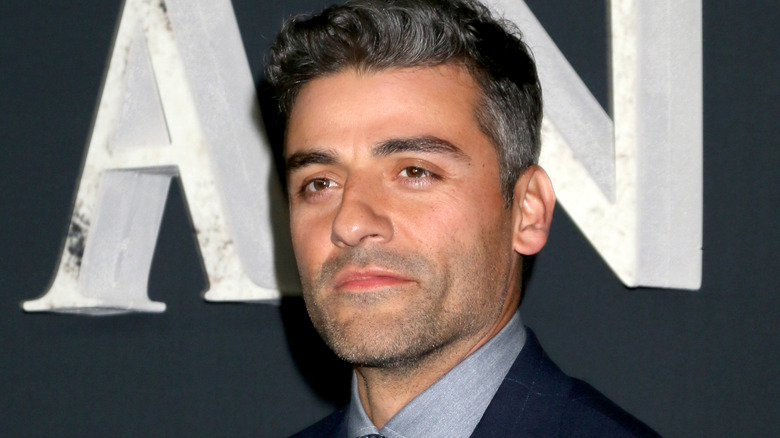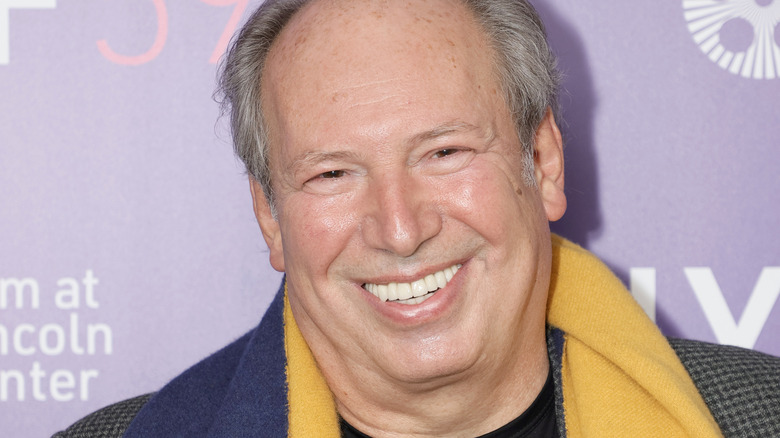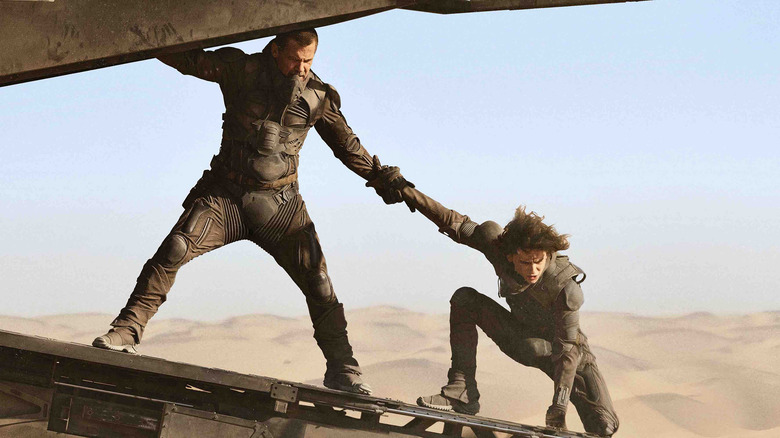Things You Need To Know About The 2021 Dune Movie
Frank Herbert's "Dune" novel has spawned an enormous creative legacy over the decades. In addition to inspiring original pieces of sci-fi storytelling across a broad spectrum of mediums, "Dune" has also been woven into the fabric of cinema since the 1970s. That's the era in which Alejandro Jodorowsky embarked on bringing "Dune" to life as a feature film, an ambitious project that never saw the light of day. Since then, several iterations of a "Dune" movie adaptation have been conceived. Some (like David Lynch's 1984 take) actually made it to the box office, while most others did not.
One of the most famous examples of a "Dune" adaptation that appeared on the silver screen is Denis Villeneuve's take on the material, which features an all-star cast consisting of Timothée Chalamet, Oscar Isaac, Zendaya, and many others. Given what a dense history "Dune" has in the world of filmmaking, it shouldn't be a surprise that the 2021 "Dune" also has an extensive past filled with vital information. Let the spice and trivia flow!
The Peter Berg version of Dune
Denis Villeneuve may be the first 21st-century filmmaker to get a "Dune" movie off the ground, but he's not the only one to attempt such a feat. In fact, during the 2000s, Paramount Pictures worked overtime to get a new film version of "Dune" up and running. To handle this task, the studio hired Peter Berg in 2008 to direct the new take on the sci-fi classic (via Variety).
Though perhaps best known for regular work with Mark Wahlberg on movies like "Spenser Confidential," Berg was hot off the blockbuster "Hancock" in 2008, which demonstrated that he could direct a lucrative movie with lots of VFX. Add in his experience directing crowd pleasing, mainstream fare like "Friday Night Lights" and it becomes clear why Paramount saw Berg as a good choice to direct a version of "Dune" that could appeal to the masses. However, there was at least one questionable aspect regarding Berg helming the feature.
In the grand scheme of Berg's career, "Hancock" is the director's only foray into sci-fi filmmaking, making it odd he'd embark on the extremely heightened cosmic storytelling of "Dune." Given this, it may not be surprising that Berg later walked away from the production entirely (per Pajiba). If you want a glimpse of what Berg's vision of Arrakis would have offered, some concept art from the abandoned project will have to suffice.
Paramount's four-year effort to make Dune
With Peter Berg onboard to direct, Paramount's version of "Dune" seemed to be on course to movie theaters everywhere. However, as the years went on, the project faced additional struggles, including the departure of Berg in 2009. Pierre Morel took over the production (via Variety), a potentially promising sign that this incarnation of "Dune" would finally see the light of day. Unfortunately, there would be no more progress on Morel's take on the material.
In 2011, Deadline revealed that Paramount Pictures had officially let its film rights to "Dune" lapse, ending an endeavor to bring this story to the screen that had lasted a whopping four years. During that time, no concrete movie materialized. The primary issue Paramount had with a "Dune" movie was budgetary concerns, though constant struggles to perfect the script also played a part. In other words, the spice would not flow at Paramount.
Even with discouraging development, Richard P. Rubinstein, who controls the rights to "Dune," noted he wasn't giving up on the prospect of a blockbuster adaptation of the novel and that securing financing was the only hurdle to getting the feature made. He even commented that it was possible Morel could be brought on to a new version of the project at another studio. In the long haul, though, it would take a whole decade more for a new "Dune" movie to materialize.
Denis Villeneuve's passion for Dune
It's easy to be cynical when you see news that a big-name auteur has decided to pursue directing a blockbuster movie. The worst-case scenario involves filmmakers cranking out flavorless blockbusters that anyone could have crafted. However, Denis Villeneuve wasn't just looking at "Dune" as an easy paycheck. In fact, he was very open about his desire to direct a new version of "Dune" long before he signed onto the project!
"A longstanding dream of mine is to adapt 'Dune,'" Villeneuve told Variety in September 2016. "But it's a long process to get the rights, and I don't think I will succeed." Villeneuve eventually made it happen, as evidenced by the release of "Dune" in 2021. While promoting this project's premiere (via MSN), Villeneuve reaffirmed that he'd harbored an affection for the material for "over 35 years", a long-simmering passion that motivated his every move on the blockbuster.
David Lynch's Dune had no influence on Villeneuve's take
Back in 1984, David Lynch directed a film adaptation of "Dune" that was greeted with a flurry of hype but ended up becoming a divisive picture that failed to leave much of an impact on the box office. Though it has garnered its fair share of fans in the years since it first hit movie theaters, Denis Villeneuve made it apparent that Lynch's take on the world of "Dune" did not influence his 2021 version of the material. However, this wasn't intended as an insult to the filmmaker behind "Mulholland Drive."
"David Lynch did an adaptation in the '80s that has some very strong qualities. I mean, David Lynch is one of the best filmmakers alive, I have massive respect for him," Villeneuve said to Yahoo. "But when I saw his adaptation, I was impressed, but it was not what I had dreamed of, so I'm trying to make the adaptation of my dreams."
Years later, Villeneuve elaborated to Empire that his "Dune" film didn't take more cues from Lynch's vision because he was "only half-satisfied" with the 1984 motion picture. In fact, Villeneuve's discomfort with parts of that adaptation inspired him to pursue his own feature. In other words, those looking forward to spotting a pug or sting in Villeneuve's "Dune" should temper those expectations.
Why 2021's Dune is more diverse than its source material
While Denis Villeneuve has made it apparent that he's devoted to Frank Herbert's original "Dune" text, he's also been open about aspects of the film that needed to be updated for a 2021 adaptation. Among the most notable alterations was changing the race and genders of certain characters, such as Dr. Liet-Kynes. A white male in the original text and portrayed by Max von Sydow in David Lynch's 1984 "Dune" movie, Villeneuve's project reimagines Liet-Kynes as a woman of color played by Sharon Duncan-Brewster.
This deliberate choice on the part of Villeneuve resonated positively with the assembled "Dune" actors. "What Denis had stated to me was there was a lack of female characters in his cast, and he had always been very feminist, pro-women, and wanted to write the role for a woman," Duncan-Brewster commented to Vanity Fair. "This human being manages to basically keep the peace amongst many people. Women are very good at that, so why can't Kynes be a woman? Why shouldn't Kynes be a woman?" By taking this route with characters like Kynes, the world of Arrakis could be a lot more in tune with the diversity of reality.
Timothée Chalamet actively pursued Dune
Timothée Chalamet has already appeared in several beloved movies like "Call Me by Your Name" and "Little Women," but with "Dune," the young performer took a severe change of pace and leapt into the world of headlining blockbusters. Playing the film's protagonist, "Dune" was a massive undertaking for Chalamet and it's easy to imagine most young actors feeling intimidated by such a gargantuan effort. However, Chalamet didn't cower from the opportunity — he eagerly pursued the part.
In an interview with Empire Magazine, Chalamet revealed that he was so excited about Denis Villeneuve adapting "Dune" that he tracked the film long before being cast. He then travelled to France just to get a chance to talk to Villeneuve about the opportunity of appearing in "Dune." "I can't pretend that I was sitting there evaluating whether I wanted to do this or not," Chalamet said. "It's very obvious, just the opportunity to work with Denis. I'm a huge fan."
While talking to Time Magazine, Chalamet also revealed that the underlying themes of the original "Dune" book appealed to him. Given that this text covers topics like colonialism and environmentalism, it's clear why he saw the 1965 novel as ripe for a 21st-century adaptation. With his affinity for Villeneuve and the core ideas at the heart of "Dune," it's no surprise that Chalamet embraced such a towering production.
How Dune utilized IMAX cameras
Denis Villeneuve was no stranger to large scale science-fiction cinema before embarking on "Dune" thanks to directing "Arrival" and "Blade Runner 2049." The latter film released in IMAX and was specially formatted for the premium viewing experience, however, it was not shot with IMAX cameras. When Villeneuve returned to the genre with "Dune," he figured out a way to ensure that the book adaptation would automatically offer something his prior sci-fi films did not. The vast world that Frank Herbert created decades prior was filmed using IMAX cameras that could capture equally expansive images.
The Hollywood Reporter shared more specific details about the filming process for "Dune," revealing that Villeneuve and cinematographer Greig Fraser used ARRI's Alexa LF. This digital camera is part of a groundbreaking new collaboration between companies like Sony, Panasonic, and IMAX. Essentially, this agreement allows films like "Dune" a wider variety of camera choices when filming projects in IMAX. While the implications of this new deal could stretch far beyond just one movie, it meant Villeneuve could capture the world of science-fiction cinema like never before.
Stellan Skarsgård spent a lot of time in the makeup chair
Baron Vladimir Harkonnen, both in the original "Dune" novel and in most traditional adaptations of the source material, is depicted as an enormous figure that looks far removed from any normal human being and is largely defined by his massive weight. Actor Stellan Skarsgård, who portrayed Harkonnen in Villeneuve's "Dune," almost certainly expected that playing the antagonist would require a significant amount of makeup work.
"I did eight or ten days on the movie, so my character doesn't show up for too much, but his presence will be felt," Skarsgård told The Daily Beast. "He's such a frightening presence where even if he doesn't say anything, I think you'll be afraid of him. And I'm extremely fat. I had eight hours in the makeup chair every day. And in some scenes, I look very tall because I levitate." All of that effort sounds incredible taxing, but it's reflective of the level of commitment the artists on "Dune" had to bringing this beloved story to life.
How Oscar Isaac see's Dune as different from Star Wars
Oscar Isaac has had a recurring presence in the world of science fiction cinema. This has manifested in projects ranging from "Annihilation" to providing a voiceover cameo in "Spider-Man: Into the Spider-Verse" to his memorable lead turn in "Ex Machina." Of course, his most famous foray into the genre was portraying Poe Dameron in the "Star Wars" sequel trilogy. Given his extensive experience in a galaxy far, far away, you can't help but wonder if Isaac hesitated pursuing another big-budget sci-fi blockbuster like "Dune."
It turns out Isaac had no problem slipping into another sci-fi role so soon after completing his "Star Wars" duties. In fact, he didn't see many, if any, similarities between the two properties. "Sure, there's also some spaceships," Isaac said to Total Film (via GamesRadar) about the shared links between "Dune" and "Star Wars." "But that's really about where the similarities end. ['Dune's'] not a typical sci-fi film. It has elements of that, but it's also a meditation. What Frank Herbert did, and then Denis as well, is to explore those themes of family, of the clashes of cultures, and just put it on a stage that allows you to dream with it." Finding those levels of variety and detail not only made Isaac comfortable exploring the world of "Dune," but also show how Isaac is able to make each of his sci-fi performances so singular.
Zendaya was only on set for four days
In a short span of time, Zendaya has built an impressive presence in the world of cinema. Not only is she the female lead of the Marvel Cinematic Universe's solo "Spider-Man" movies, she's also appeared in the hit musical "The Greatest Showman" and scored rave reviews for her performance in "Malcolm & Marie." Given the acclaim she's already cultivated, it is interesting to realize how little time Zendaya spent on the set of "Dune" bringing the character Chani to life.
"I was only there for four days and I did not want to leave!" Zendaya revealed to Empire. "Denis understands what he wants from us but he's also very collaborative, allowing me to have my take on the character as well." It turns out these feelings were reciprocated by Villeneuve. While talking to Vogue, the auteur expressed nothing but praise for Zendaya and was especially astonished by how much tactility she lent her on-screen performance. He even went on to call her "one of the most professional artists I've ever worked with," a high compliment given the assortment of gifted performers and crew members that have contributed to Villeneuve's features.
With so many good vibes on the "Dune" set, it's no wonder Zendaya wanted to spend more than four days on Villeneuve's version of Arrakis.
Hans Zimmer scored Dune instead of Tenet
Hans Zimmer and Christopher Nolan have been like two peas in a pod ever since they collaborated for the first time on "Batman Begins" (per Classic FM). The duo's work together has resulted in some impressive soundtracks, including the orchestral tracks for "Inception" and "Dunkirk." While it seemed like they'd always be creating together, their union ground to a halt when it came time for the 2020 Nolan feature "Tenet," which was scored by Ludwig Goransson.
What happened here? As reported by The Playlist, Zimmer really wanted to score "Dune." The initial production schedule for "Dune" conflicted directly with "Tenet" and ensured that Zimmer would have to choose one project over the other. Given that Zimmer is a lifelong fan of the original "Dune" novel, the composer opted to tackle Villeneuve's new adaptation rather than the latest Nolan joint. It helped too that the "Dune" production employed editor Joe Walker, a figure Zimmer worked with several times before on projects like "12 Years a Slave."
With familiar faces like Walker and Villeneuve (the latter of whom Zimmer partnered with for "Blade Runner 2049") along for the ride, it was easy for this composer to slip into the world of "Dune." Nolan and Zimmer's constant partnership seemed unshakable but the power of "Dune" can accomplish unthinkable feats.
How Villeneuve feels about Dune's simultaneous HBO Max launch
In December 2020, Warner Bros. dropped a bombshell announcement that, in response to the COVID-19 pandemic, all of the studio's titles for 2021 would receive simultaneous theatrical and HBO Max streaming debuts (via The New York Times). According to The Hollywood Reporter, the reception to this development was predominantly negative, especially from the creative participants of the various titles on the company's slate. But nobody made their disapproval more widely-known than "Dune" director Denis Villeneuve, who outlined his concerns in an editorial for Variety.
Villeneuve began the piece by revealing that he'd discovered the HBO Max revelation not via a Warner Bros. representative but when flipping through the news. He went on to lambast the decision as being motivated to appease AT&T stockholders rather than upholding the good of either consumers or directors. He further bemoaned how many years he and the other crew members worked on the film while glibly predicting that the impact an HBO Max release would have on the film's box office would immediately wipe out hopes to create a sequel to the sci-fi epic.
Despite Villeneuve condemning the release strategy and "Dune" actors like Jason Momoa and Josh Brolin expressing support for his theatrical-exclusivity wishes (via NME), studio brass did not listen. Warner Bros. went right on ahead with its plans to give "Dune" a simultaneous theatrical/HBO Max premiere in North America.
